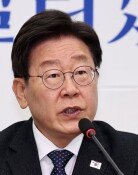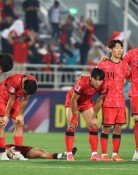Gov`t Admits to Secret Talks on Inter-Korean Summit
Gov`t Admits to Secret Talks on Inter-Korean Summit
Posted October. 24, 2009 09:07,
The government has admitted as true news reports of a secret meeting in Singapore between both Koreas on a proposed third inter-Korean summit.
A key presidential official in Seoul told reporters yesterday, It is a matter of the past and useless to discuss now, implying that both Koreas did hold talks on the summit.
The presidential office had denied the reports until Thursday, saying, We are unaware or We cannot confirm.
All South Korean officials remained tightlipped about what was discussed in Singapore, however.
The meeting is believed to be the first action taken by the Lee Myung-bak government after it repeatedly emphasized the need and potential for the inter-Korean summit since its inauguration last year.
What Seoul and Pyongyang discussed in Singapore remains unknown. Many analysts say, however, that both sides sought to open a channel of dialogue to arrange a summit between President Lee and North Korean leader Kim Jong Il.
In his summit with Cambodian Prime Minister Hun Sen in Phnom Penh Thursday, I believe Pyongyang will also have keen interest in my grand bargain proposal to resolve the nuclear standoff, hinting that the two Koreans might have coordinated agendas.
Criticism has ensued, however, over Seouls decision to use a secret contact to arrange the summit. President Lee has repeatedly stressed transparency and public consensus in inter-Korean relations.
As a presidential candidate in April 2007, he said in a speech to the Republic of Korea Parliamentarian Society, Talks that are not transparent and lack public consensus cannot gain public trust.
When briefed by the Justice Ministry March 26 last year, he said, There will no negotiations with Pyongyang that runs counter to public sentiment. Inter-Korean issues will be addressed in a very transparent manner in compliance with rules accepted by the international community.
Proceedings before, during and after the latest contact did not comply with such principles that the government had pledged to follow. Seouls representative at the Singapore meeting was reportedly not an official but a politician or civilian close to President Lee.
This channel is no different from that of unofficial aides active under the liberal Kim Dae-jung and Roh Moo-hyun administrations. Moreover, government officials have insisted that they knew nothing of the matter.
Presidential secretary for foreign affairs and national security Kim Sung-han and Unification Minister Hyun In-taek had said they knew nothing through yesterday.
An expert in North Korean affairs said, President Lee either mobilized the unofficial aides channel or the government officials in charge lied to the public.
A presidential office source said, however, The special nature of inter-Korean relations must be considered. The government should not disclose all contacts involving even low working-level staff.
Nonetheless, the Lee administration is under fire for allegedly pursuing a summit by violating its principles at this time, when no public consensus exists on the need for a summit.
A diplomatic and national security expert said, Pyongyangs time-honored method of survival is to condemn Seoul and employ a military threat for one or two years after a new government is inaugurated in the South, before demanding economic aid under the pretext of a summit.
Those in power in the South have responded to the Norths overture to maintain their popularity and extend their terms in office. The incumbent government appears no different from its predecessors.
koh@donga.com kyle@donga.com







